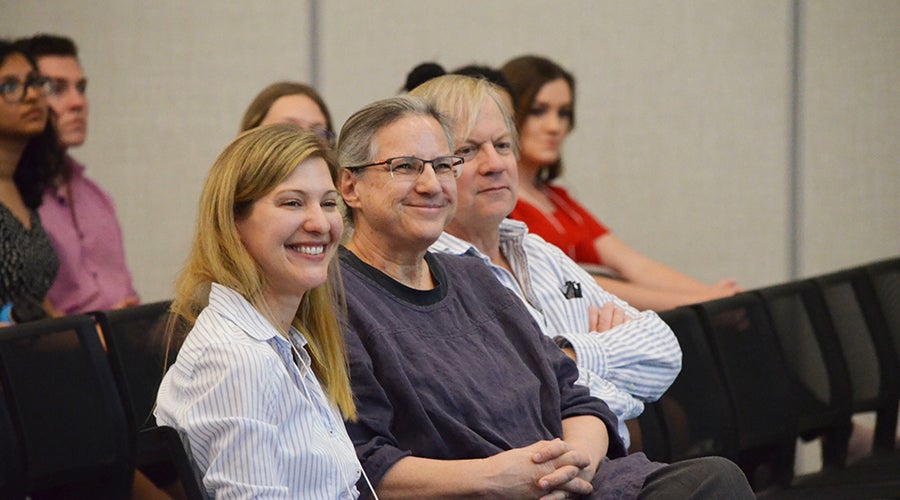ASU alumna shares perspective with STEM undergraduate researchers

Indiana University Bloomington Professor Megan Thielges and SMS Professor James Allen.
This past March, Megan Thielges returned to Arizona State University not as an undergraduate chemistry student, but as the keynote speaker at the 26th annual Undergraduate Research Symposium hosted by the School of Life Sciences, in conjunction with the SOLUR Undergraduate Research Program.
The symposium provides a chance for undergraduate researchers to present what they've learned through their research experiences. The event is open to faculty, staff, students and the general public.
In a talk titled "Trek of a Biophysicist," Thielges shared her story of progress from an undergraduate at ASU to an associate professor in the department of chemistry at the University of Indiana Bloomington. She described her personal development in science while sharing a broader perspective gained along the way.
“My career as an academic professor should be considered a lifestyle. I feel very fortunate to do what I love,” Thielges said. “The freedom to pursue my interests is the key advantage of my specific position.”
Thielges received her BS (summa cum laude) at ASU in 2003. She was awarded a National Science Foundation Graduate Fellowship for training in biophysics at the Scripps Research Institute in La Jolla, California, where she earned a PhD under the direction of Professor Floyd E. Romesberg in 2009. She went on to a Ruth L. Kirschstein National Institutes of Health-funded postdoctoral fellowship with Professor Michael D. Fayer at Stanford University. She joined the faculty at Indiana University in the summer of 2012.

From left to right: Megan Thielges, Joann Williams and James Allen Photo. Courtesy Jacob Sahertian, School of Life Sciences
Thielges answered a few questions about her experience at ASU, her work today and the advice she has for those who are interested in studying in the STEM field.
Question: How did your undergraduate experience in the School of Molecular Sciences at ASU prepare you for your current career path?
Answer: My experience in a research group as an undergraduate was most valuable to my career trajectory. The experience convinced me to pursue a career in academic research and bolstered my application for top graduate programs, setting up my path to becoming a professor myself.
Q: What is it like applying your degree in a new area?
A: The interdisciplinary nature of our research is very challenging. Gaining depth of understanding in multiple scientific areas requires versatile thinking and simply more time. For this reason, I also find it difficult to train new students in our research group. However, I am excited by the science so the challenge is worthwhile.
Q: Can you describe your Sun Devil story? What brought you to ASU?
A: Honestly, having grown up in the cold of North Dakota, initially I considered ASU because of the warm weather and the offer of a generous scholarship package. I had just applied for fellowships, which made me aware of the importance of research experience. When I visited, ASU promoted their undergraduate research programs, and learning about all the opportunities cemented my decision to attend ASU.
Q: What are some of your favorite memories of ASU — academic, research or otherwise?
A: My time in the laboratory was the highlight of my undergraduate years. I worked with a fantastic bunch of graduate students, and my mentors were very supportive. A research lab becomes one’s family.
Q: What is your advice for current students in the School of Molecular Sciences who are thinking of pursuing a career path similar to yours?
A: While my work is satisfying, the career also is very competitive, so you have to be consistently dedicated, which can mean giving up other things in life, as well as getting used to handling setbacks and criticism. There are many excellent career paths in which you can do science. Also, as an undergraduate, I did not realize how so-called “soft” skills, like communicating effectively both verbally and in writing or interacting with and motivating people with diverse personalities, are just as critical to your success as your technical understanding of science.
Q: What would you tell a prospective ASU student that they need to know about studying in the School of Molecular Sciences at ASU?
A: Take advantage of all that is offered. Don’t be shy to engage your professors. Enjoy being a student. Your undergraduate years likely will be among the best times in your life.
More Science and technology

Science meets play: ASU researcher makes developmental science hands-on for families
On a Friday morning at the Edna Vihel Arts Center in Tempe, toddlers dip paint brushes into bright colors, decorating paper…

ASU water polo player defends the goal — and our data
Marie Rudasics is the last line of defense.Six players advance across the pool with a single objective in mind: making sure that…

Diagnosing data corruption
You are in your doctor’s office for your annual physical and you notice the change. This year, your doctor no longer has your…

